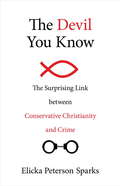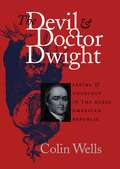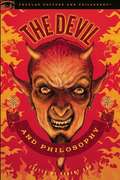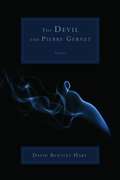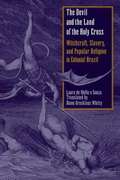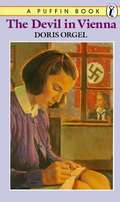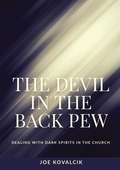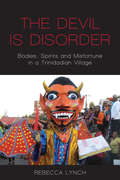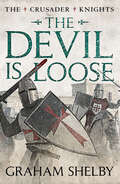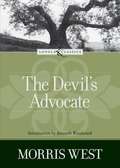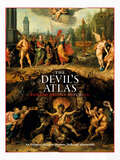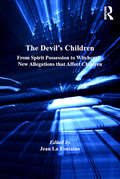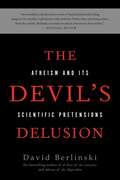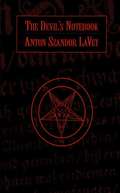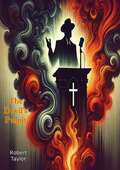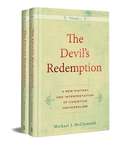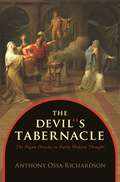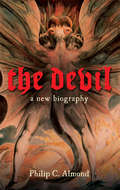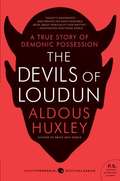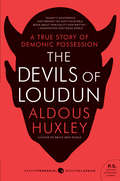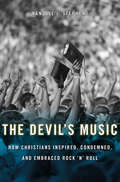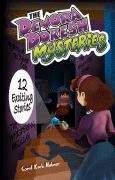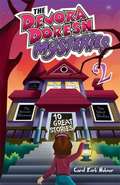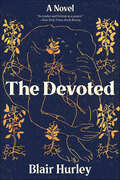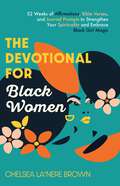- Table View
- List View
The Devil You Know
by Elicka Peterson-SparksIn this trenchant examination of Christianity's dark side, a criminologist argues persuasively that high rates of violent crime in the United States can be correlated with Christian conservative attitudes, especially in regard to social mores and politics. Of particular concern is "Christian nationalism." Supporters of this movement argue that America was founded as a Christian nation and they work to install their fundamentalist brand of Christianity as the dominant factor in American political and social life. Far from being a fanatic outlier sect, this group is shown to have significant cultural influence, especially in the American South. Not coincidentally, the author suggests, the South also has the highest homicide rates. Noting the violent biblical passages often cited by religious conservatives, their sense of righteousness, their dogmatic mindset that tolerates no dissent, and their support for harshly punitive measures toward "sinners," Peterson Sparks shows that their worldview is the ideal seedbed for violence. Not only does this mindset make violent reactions in interpersonal conflicts more likely, the author says, but it exacerbates the problems of the criminal justice system by advocating policies that create high incarceration rates. The author also devotes particular attention to the victimization of women, children, and LGBT people, which follows from this rigid belief system. While not resorting to a blanket condemnation of Christianity or religion as a whole, Peterson Sparks issues a wake-up call regarding conservative Christianity's toxic mixture of fundamentalism, authoritarian politics, patriotism, and retributory justice.From the Hardcover edition.
The Devil and Doctor Dwight
by Colin WellsAt the close of the eighteenth century, Timothy Dwight--poet, clergyman, and, later, president of Yale College--waged a literary and intellectual war against the forces of "infidelity." The Devil and Doctor Dwight reexamines this episode by focusing on The Triumph of Infidelity (1788), the verse satire that launched Dwight's campaign and, Colin Wells argues, the key to recovering the deeper meaning of the threat of infidelity in the early years of the American Republic. The book also features the first modern, annotated edition of this important but long-overlooked poem.Modeled after Alexander Pope's satiric masterpiece, the Dunciad, Dwight's poem took aim at a number of his contemporaries, but its principal target was Congregationalist Charles Chauncy, author of a controversial treatise asserting "the salvation of all men." To Dwight's mind, a belief in universal salvation issued from the same naive faith in innate human virtue and inevitable progress that governed all forms of Enlightenment thought, political as well as religious. Indeed, in subsequent works he traced with increasing dismay a shift in the idea of universal salvation from a theological doctrine to a political belief and symbol of American national identity. In this light, Dwight's campaign against infidelity must also be seen as an early and prescient critique of the ideological underpinnings of Jeffersonian democracy.
The Devil and Philosophy
by Robert ArpIn The Devil and Philosophy, 34 philosophers explore questions about one of the most recognizable and influential characters (villains?) of all time. From Roman Polanski's The Ninth Gate to J.R.R. Tolkien's The Silmarillion to Bram Stoker's Dracula to Darth Vader to Al Pacino's iconic performance in The Devil's Advocate, this book demonstrates that a little devil goes a long way. From humorous appearances, as in Kevin Smith's film Dogma and Chuck Palahniuk's novels Damned and its sequel Doomed, to more villanous appearances, such as Gabriel Byrne's cold outing as Satan in End of Days, The Devil in Philosophy proves that the Devil comes in many forms.Through the lenses of Jung, Kant, Kundera, Balkan, Plato, Bradwardine, Aristotle, Hume, Blackburn, Descartes, Lavey, Thoreau, and Aquinas, The Devil and Philosophy take a philosophical look at one of time's greatest characters. Are there any good arguments for the actual existence of the Devil? Does demonic evil thrive in Gotham City? Can humans really be accountable for all evil? Which truths about the Devil are actual facts? Is Milton correct, in that the Devil believes he is doing good?
The Devil and Pierre Gernet
by David Bentley HartBrilliant Scholar and Wordsmith David Bentley Hart turns his mind and imagination to narrative fiction in this volume, The Devil and Pierre Gernet, a thought provoking collection of four short stories and one novella. Anticipating questions about his shift in genre, Hart writes that "God is no more likely (and probably a good deal less likely) to be found in theology than in poetry and fiction. " These stories beguile and entrance the reader through Hart's engrossing, opulent writing style and the complex characters he evokes and explores. Often bedazzling, sometimes heartbreaking, and ultimately mesmerizing, Hart's wide-ranging stories are united by a common thread of haunting religious and philosophical questions about this life and the next. Here is fiction to fully engage both the mind and the heart. Book jacket.
The Devil and the Land of the Holy Cross: Witchcraft, Slavery, and Popular Religion in Colonial Brazil
by Laura de Mello e SouzaOriginally published in Brazil as O Diabo e a Terra de Santa Cruz, this translation from the Portuguese analyzes the nature of popular religion and the ways it was transferred to the New World in the sixteenth and seventeenth centuries. Using richly detailed transcripts from Inquisition trials, Mello e Souza reconstructs how Iberian, indigenous, and African beliefs fused to create a syncretic and magical religious culture in Brazil. Focusing on sorcery, the author argues that European traditions of witchcraft combined with practices of Indians and African slaves to form a uniquely Brazilian set of beliefs that became central to the lives of the people in the colony. Her work shows how the Inquisition reinforced the view held in Europe (particularly Portugal) that the colony was a purgatory where those who had sinned were exiled, a place where the Devil had a wide range of opportunities. Her focus on the three centuries of the colonial period, the multiple regions in Brazil, and the Indian, African, and Portuguese traditions of magic, witchcraft, and healing, make the book comprehensive in scope. Stuart Schwartz of Yale University says, "It is arguably the best book of this genre about Latin America . . . all in all, a wonderful book. " Alida Metcalf of Trinity University, San Antonio, says, "This book is a major contribution to the field of Brazilian history . . . the first serious study of popular religion in colonial Brazil . . . Mello e Souza is a wonderful writer. "
The Devil in Vienna
by Doris OrgelInge Dorenwald and Lieselotte Vessely have been best friends for most of their thirteen years. They share secrets, fears, hopes and even the same birthday. It never mattered that Inge was Jewish and that Lieselotte was the daughter of a Nazi SS officer--until now. Hitler and Nazism are infiltrating Vienna, Austria, in 1938 and suddenly it is forbidden for the girls to continue seeing each other. Despite the danger, Inge and Liselotte struggle to keep their friendship alive. But will they be able to do it? A new afterword by the author, who based the story on her own experiences during World War II, is included.
The Devil in the Back Pew: Dealing with Dark Spirits in the Church
by Joe KovalcikThe Devil in the Back Pew is a simple manual bringing to light the need for, and methods of, personal spiritual warfare and deliverance. <P><P>The motivation for this book is rooted in the experience and observation of the author: far too few understand the extent of the enemy’s works or know how to deal with them if they do. The devil is pursuing everyone . . . and he does not give up!Explained are the Biblical foundations of the dark spirit realm, and how this can be discerned and dealt with. <P><P>The various types of enemy harassment are explored in depth, and methods to overcome barriers to victory (the prerequisites for success) are discussed in detail. Importantly, these techniques are applicable to all types of dark spiritual incursions, from simple temptation to significant demonization. <P><P>The many issues and topics relevant to effectively confronting the enemy are fully explored. And Biblically-sound solutions are offered. Learn how to exercise your God-given authority and drive the prince of darkness away!
The Devil is Disorder: Bodies, Spirits and Misfortune in a Trinidadian Village
by Rebecca LynchWhat role might the Devil have in health and illness? The Devil is Disorder explores constructions of the body, health, illness and wider misfortune in a Trinidadian village where evangelical Christianity is growing in popularity. Based on long-term ethnography and locating the village in historical and global context, the book takes a nuanced cosmological approach to situate evangelical Christian understandings as shaping and being shaped by their context and, in the process, shaping individuals themselves. As people move from local to global subjects, health here stretches beyond being a matter of individual bodies and is connected to worldwide flows and networks, spirit entities, and expansive moral orders.
The Devil is Loose (The Crusader Knights Cycle)
by Graham ShelbyWill Richard the Lionheart reclaim his throne in this epic historical adventure of the Crusader KnightsIt is winter in England, 1192. Richard Coeur de Lion, the battle-hardened warrior-king, has been captured and imprisoned returning from the Crusades – after spending only a few months in the land he is supposed to rule. As the winter snow melts, England pays the price of being a kingdom without a king. For Richard’s jealous and spiteful brother John, not content with robbing his brother’s subjects of all they have, plans insurrection to wrest the throne itself… But then a second message comes, one which chills even John’s thin blood: ‘Le diable étoit déchaîné,’ ‘The devil is loose!’ The game is on, and everything is to play for. The fourth exciting instalment of The Crusader Knights Cycle is perfect for fans of Griff Hosker, Jonathan Lunn and Conn Iggulden. ‘Vivid and engaging’ Scotsman
The Devil's Advocate
by Morris West Kenneth WoodwardIn a desolated village in southern Italy, the life and death of Giacamo Nerone has inspired talk of sainthood. Father Blaise Meredith, a dying English priest, is sent from the Vatican to investigate. In this novel, Morris West deftly explores the meaning of faith and humanity in this intriguing tale of secrets, lies, and sanctity.
The Devil's Atlas: An Explorer's Guide to Heavens, Hells and Afterworlds
by Edward Brooke-HitchingPacked with strange stories and spectacular illustrations, The Devil's Atlas leads you on an adventure through the afterlife, exploring the supernatural worlds of global cultures to form a fascinating traveler's guide quite unlike any other. From the author of the critically acclaimed bestsellers The Phantom Atlas, The Sky Atlas, and The Madman's Library comes a unique and beautifully illustrated guide to the heavens, hells, and lands of the dead as imagined throughout history by cultures and religions around the world. Packed with colorful maps, paintings, and captivating stories, The Devil's Atlas is a compelling tour of the geography, history, and supernatural populations of the afterworlds of cultures around the globe. Whether it's the thirteen heavens of the Aztecs, the Chinese Taoist netherworld of "hungry ghosts," Islamic depictions of Paradise, or the mysteries of the Viking mirror world, each is conjured through astonishing images and a highly readable trove of surprising facts and narratives, stories of places you'd hope to go, and those you definitely would not. A traveler's guide to worlds unseen, here is a fascinating visual chronicle of our hopes, fears, and fantasies of what lies beyond. DISCOVER THE BEYOND: From the depths of underworlds to the heights of heavens and everywhere else a life after death may be spent, this atlas explores the geography, history, and supernatural populations of the afterworlds of global mythologies. A GLOBAL SURVEY: From the demon parliament of the ancient Maya, to the eternal globe-spanning quest to find the Earthly Paradise, to the "Hell of the Flaming Rooster" of Japanese Buddhist mythology (in which sinners are tormented by an enormous fire-breathing cockerel), The Devil's Atlas gathers together a wonderful variety of beliefs and representations of life after death. UNUSUAL AND UNSEEN: These afterworlds are illustrated with an unprecedented collection of images. They range from the marvelous "infernal cartography" of the European Renaissance artists attempting to map the structured Hell described by Dante and the decorative Islamic depictions of Paradise to the various efforts to map the Garden of Eden and the spiritual vision paintings of nineteenth-century mediums. EXPERT AUTHOR: Edward Brooke-Hitching is a master of taking visually–driven deep dives into unusual historical subjects, such as the maps of imaginary geography in The Phantom Atlas, ancient pathways through the stars in The Sky Atlas, and the literary oddities lining the metaphorical shelves of The Madman's Library. Perfect for:Obscure history and mythology enthusiastsAnyone with an interest in the occultSpiritual curiosity seekersMap lovers
The Devil's Children: From Spirit Possession to Witchcraft: New Allegations that Affect Children
by Jean La FontaineA number of cases of serious child abuse have resulted from beliefs that children may be possessed by evil spirits and may then be given the power to bewitch others. Misfortune, failure, illness and even death may be blamed on them. The 'cure', nowadays called deliverance rather than exorcism, is to expel the spirits, sometimes by violent means. This book draws together contributions on aspects of possession and witchcraft from leading academics and expert practitioners in the field. It has been put together following conferences held by Inform, a charity that provides accurate information on new religions as a public service. There is no comparable information publicly available; this book is the first of its kind. Eileen Barker, founder of Inform, introduces the subject and Inform's Deputy Director goes on to detail the requests the charity has answered in recent years on the subject of children, possession and witchcraft. This book offers an invaluable resource for readers, whether academic or practitioner - particularly those in the fields of the safeguarding of children, and their education, health and general welfare.
The Devil's Delusion: Atheism and its Scientific Pretensions
by David BerlinskiMilitant atheism is on the rise. In recent years Richard Dawkins, Sam Harris, Daniel Dennett, and Christopher Hitchens have produced a steady stream of best-selling books denigrating religious belief. These authors are merely the leading edge of a larger movement that includes much of the scientific community.In response, mathematician David Berlinski, himself a secular Jew, delivers a biting defense of religious thought. The Devil's Delusion is a brilliant, incisive, and funny book that explores the limits of science and the pretensions of those who insist it is the ultimate touchstone for understanding our world.
The Devil's Notebook
by Anton Szandor LaveyWisdom, humor, and dark observations by the founder of the Church of Satan. LaVey ponders such topics as nonconformity, occult faddism, erotic politics, the "Goodguy badge," demoralization and the construction of artificial human companions.
The Devil's Pulpit: Or Astro-theological Sermons (classic Reprint)
by Robert TaylorDive into the provocative and insightful world of Robert Taylor's "The Devil's Pulpit," a work that challenges conventional religious beliefs and explores the deep connections between Christianity and ancient mythologies. Known for his eloquence and bold viewpoints, Robert Taylor offers a series of lectures that question the historical authenticity and origins of Christian doctrines, presenting a compelling case for their roots in pre-Christian myths.In "The Devil's Pulpit," Taylor meticulously examines the parallels between well-known biblical narratives and ancient pagan traditions. With keen analytical skills and thorough research, he draws comparisons between the stories of the virgin birth, crucifixion, resurrection, and other key elements of the Christian faith and similar themes found in earlier mythological systems. Taylor's work illuminates the syncretic nature of religious evolution, suggesting that many aspects of Christian teachings were influenced by or borrowed from older cultural myths.Taylor's lectures are not merely an academic critique; they are a passionate call for intellectual freedom and critical examination of long-held beliefs. He encourages readers to approach religious texts with a questioning mind, to seek truth beyond tradition, and to understand the historical context in which these narratives developed. His arguments are presented with clarity and conviction, making complex theological and historical concepts accessible to a wide audience.This book remains a significant contribution to religious critique and historical analysis, inviting readers to reconsider the origins and meanings of the stories that have shaped Western religious thought. "The Devil's Pulpit" stands as a testament to Robert Taylor's legacy as a courageous thinker and eloquent critic of religious orthodoxy.
The Devil's Redemption: A New History And Interpretation Of Christian Universalism
by Michael J. McClymondThe author explores what the church has taught about universal salvation and hell and critiques universalism from a biblical, philosophical, and theological standpoint. He shows that the effort to extend grace to everyone undermines the principle of grace for anyone.
The Devil's Tabernacle: The Pagan Oracles in Early Modern Thought
by Anthony Ossa-RichardsonThe Devil's Tabernacle is the first book to examine in depth the intellectual and cultural impact of the oracles of pagan antiquity on modern European thought. Anthony Ossa-Richardson shows how the study of the oracles influenced, and was influenced by, some of the most significant developments in early modernity, such as the Christian humanist recovery of ancient religion, confessional polemics, Deist and libertine challenges to religion, antiquarianism and early archaeology, Romantic historiography, and spiritualism. Ossa-Richardson examines the different views of the oracles since the Renaissance--that they were the work of the devil, or natural causes, or the fraud of priests, or finally an organic element of ancient Greek society. The range of discussion on the subject, as he demonstrates, is considerably more complex than has been realized before: hundreds of scholars, theologians, and critics commented on the oracles, drawing on a huge variety of intellectual contexts to frame their beliefs. In a central chapter, Ossa-Richardson interrogates the landmark dispute on the oracles between Bernard de Fontenelle and Jean-François Baltus, challenging Whiggish assumptions about the mechanics of debate on the cusp of the Enlightenment. With erudition and an eye for detail, he argues that, on both sides of the controversy, to speak of the ancient oracles in early modernity was to speak of one's own historical identity as a Christian.
The Devil: A New Biography
by Philip C. Almond"Although the Devil still 'lives' in modern popular culture, for the past 250 years he has become marginal to the dominant concerns of Western intellectual thought. That life could not be thought or imagined without him, that he was a part of the everyday, continually present in nature and history, and active at the depths of our selves, has been all but forgotten. It is the aim of this work to bring modern readers to a deeper appreciation of how, from the early centuries of the Christian period through to the recent beginnings of the modern world, the human story could not be told and human life could not be lived apart from the ‘life’ of the Devil. With that comes the deeper recognition that, for the better part of the last two thousand years, the battle between good and evil in the hearts and minds of men and women was but the reflection of a cosmic battle between God and Satan, the divine and the diabolic, that was at the heart of history itself."—from The Devil Lucifer, Mephistopheles, Beelzebub; Ha-Satan or the Adversary; Iblis or Shaitan: no matter what name he travels under, the Devil has throughout the ages and across civilizations been a compelling and charismatic presence. In Christianity, Judaism, and Islam, the supposed reign of God has long been challenged by the fiery malice of his opponent, as contending forces of good and evil have between them weighed human souls in the balance. In The Devil, Philip C. Almond explores the figure of evil incarnate from the first centuries of the Christian era. Along the way, he describes the rise of demonology as an intellectual and theological pursuit, the persecution as witches of women believed to consort with the Devil and his minions, and the decline in the belief in Hell and in angels and demons as corporeal beings as a result of the Enlightenment. Almond shows that the Prince of Darkness remains an irresistible subject in history, religion, art, literature, and culture. Almond brilliantly locates the “life” of the Devil within the broader Christian story of which it is inextricably a part; the “demonic paradox” of the Devil as both God’s enforcer and his enemy is at the heart of Christianity. Woven throughout the account of the Christian history of the Devil is another complex and complicated history: that of the idea of the Devil in Western thought. Sorcery, witchcraft, possession, even melancholy, have all been laid at the Devil’s doorstep. Until the Enlightenment enforced a “disenchantment” with the old archetypes, even rational figures such as Thomas Aquinas were obsessed with the nature of the Devil and the specific characteristics of the orders of demons and angels. It was a significant moment both in the history of demonology and in theology when Benedict de Spinoza (1632–1677) denied the Devil’s existence; almost four hundred years later, popular fascination with the idea of the Devil has not yet dimmed.
The Devils of Loudun
by Aldous HuxleyIn this classic nonfiction work by the legendary Aldous Huxley, a remarkable true story of religious and sexual obsession, considered a compelling historical event, is clarified and brought to vivid life.
The Devils of Loudun
by Aldous HuxleyAldous Huxley's acclaimed and gripping account of one of the strangest occurrences in historyIn 1632 an entire convent in the small French village of Loudun was apparently possessed by the devil. After a sensational and celebrated trial, the convent's charismatic priest Urban Grandier--accused of spiritually and sexually seducing the nuns in his charge--was convicted of being in league with Satan. Then he was burned at the stake for witchcraft.In this classic work by the legendary Aldous Huxley--a remarkable true story of religious and sexual obsession considered by many to be his nonfiction masterpiece--a compelling historical event is clarified and brought to vivid life.
The Devil’s Music: How Christians Inspired, Condemned, and Embraced Rock ’n’ Roll
by Randall J. StephensWhen rock ’n’ roll emerged in the 1950s, ministers denounced it from their pulpits and Sunday school teachers warned of the music’s demonic origins. The big beat, said Billy Graham, was “ever working in the world for evil.” Yet by the early 2000s Christian rock had become a billion-dollar industry. The Devil’s Music tells the story of this transformation. Rock’s origins lie in part with the energetic Southern Pentecostal churches where Elvis, Little Richard, James Brown, and other pioneers of the genre worshipped as children. Randall J. Stephens shows that the music, styles, and ideas of tongue-speaking churches powerfully influenced these early performers. As rock ’n’ roll’s popularity grew, white preachers tried to distance their flock from this “blasphemous jungle music,” with little success. By the 1960s, Christian leaders feared the Beatles really were more popular than Jesus, as John Lennon claimed. Stephens argues that in the early days of rock ’n’ roll, faith served as a vehicle for whites’ racial fears. A decade later, evangelical Christians were at odds with the counterculture and the antiwar movement. By associating the music of blacks and hippies with godlessness, believers used their faith to justify racism and conservative politics. But in a reversal of strategy in the early 1970s, the same evangelicals embraced Christian rock as a way to express Jesus’s message within their own religious community and project it into a secular world. In Stephens’s compelling narrative, the result was a powerful fusion of conservatism and popular culture whose effects are still felt today.
The Devora Doresh Mysteries #1
by Carol Korb HubnerA dozen difficult dilemmas for a dynamite detective -- Devora Doresh! Join Devora as she uses her quick mind, sharp intuition and Jewish knowledge to solve twelve mysterious cases.
The Devora Doresh Mysteries #2
by Carol Korb HubnerDevora Doresh is back! As always, her quick mind, sharp intuition and Jewish knowledge help her solve cases that leave the police stumped. Ten great stories in all!
The Devoted: A Novel
by Blair HurleyLonglisted for the Center for Fiction’s First Novel Prize “As tender and fervent as a prayer.”—New York Times Book ReviewNicole Hennessy’s world revolves around her Boston Zendo, to the chagrin of her Irish Catholic family. As she struggles to break free from a psychological and sexual entanglement with her mentor, her past finally catches up with her. A spellbinding confession of what it means to abandon one life for another, The Devoted asks what it takes, and what you’ll sacrifice, to find enlightenment.
The Devotional for Black Women: 52 Weeks of Affirmations, Bible Verses, and Journal Prompts to Strengthen Your Spirituality and Embrace Black Girl Magic
by Chelsea La'Nere BrownA Simon & Schuster eBook. Simon & Schuster has a great book for every reader.
